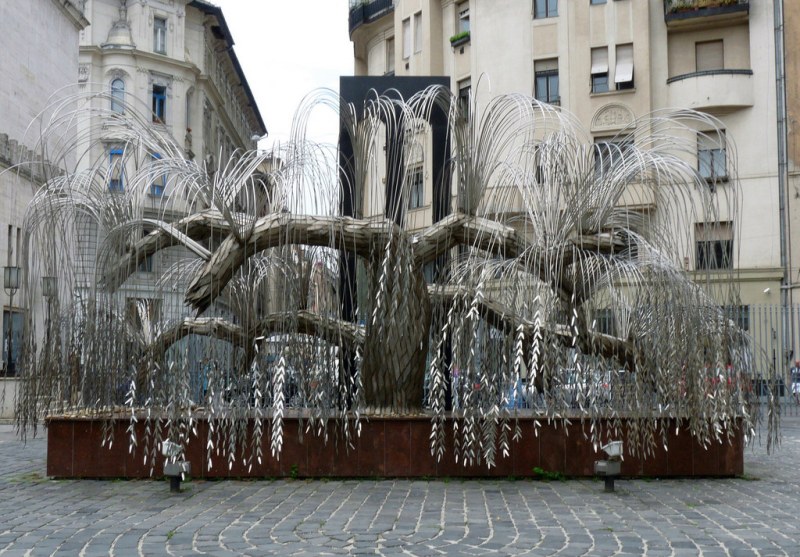The Jewish baker did not believe the Nazis would come for him. Rafael Lemkin — a Polish-born lawyer who was also Jewish and went on to create the term genocide — pleaded with the man to escape while there was still time.
But the baker stayed, and Lemkin later commented on his skepticism: “Many generations spoke through this man. He could not believe the reality of [Hitler’s intent] because it was so much against nature, against logic, against life itself, and against the warm smell of bread in his house, against his poor but comfortable bed.”
We reassure ourselves that violence happens elsewhere. Maybe in a Charleston church. In Rwanda or Darfur, perhaps. But not here. We insist that such horrors exist only in the vague outline of a dystopian future or in the hazy mist of atrocities past. Maybe in an Orwellian world. In the Third Reich, perhaps. But not today. In denying the applicability of such acts to our personal lives, we lull ourselves into a false sense of security that nefarious entities and people can exploit.
In my last column I wrote about the ways in which citizens’ lack of ability to differentiate fact from fiction threatens democracy and freedom. Individual apathy following heinous crimes — like the terror attack at the Tree of Life congregation in Pittsburgh last weekend — and an inability to internalize the realities of violence does the same.
Psychologists refer to people’s tendency “to turn the volume down on their emotions for fear of being overwhelmed … when [they] see multiple victims” as the “collapse of compassion.” Our brains can’t process mass tragedy in the same way as individual stories.
It was the image of a young Syrian boy sitting in a chair covered in blood and dust that captured that attention of the world—not the statistics about hundreds of thousands of dead. It was the picture of an emaciated young girl in Yemen and the execution of the journalist Jamal Khashoggi — not the many lives lost in “the world’s worst man-made humanitarian disaster” or the continued suppression of civil liberties — that turned people’s attention to the depravity of the brutal and barbarous Saudi Arabian regime.
To extend Lemkin’s analysis to how individuals react after atrocities, it becomes clear why it is extraordinarily difficult for many people — whose biggest problem in a day might be choosing what to eat for dinner — to confront horrors that seem distant and feel incompatible with the ability to lead a happy life.
As I sit next to the Red Hoop Fountain outside Green Library writing this column, seeing a labrador retriever playing in the fountain and young children biking around on a Sunday afternoon, I struggle to integrate my current reality with the fact that there are people who would do me harm because I am Jewish. With what happened to members of my family who I have never met because they were murdered during the Holocaust. With what nearly happened to my now 90-year-old grandfather, who narrowly escaped the clutches of a Nazi regime that killed 90 percent of the Jews in his native Lithuania.
It seems untenable to live in constant outrage. It feels easier, less troublesome to the conscience to settle into a dull state of apathy, to replace anger and tears with an aching numbness.
But are we willing to accept limits to our empathy? To rely on institutional actors that have consistently failed to prevent and stop violence? Without an ability to internally grapple with the reality of bloodshed, how do we expect to stop it from repeating?
As I was brainstorming for this column, I mentioned to my roommate how I felt it was impossible to live with the reality of evil in the back of my mind. He responded with an important clarification: what is unsustainable is to confront that reality and not do anything about it. Perhaps this is why we are drawn to individual stories. We feel that we could help one person, but are overwhelmed by the scope of systemic problems.
Yet we forget that the burden on the individual is not to fix the world. It is not “you” or “me” vs anti-Semitism, terrorism, fascism or genocide. You do not need to stare down evil alone, to stand in front of the tank treads and bear their full weight. Rather, it is us, acting with the strength of individual conviction and the might of collective action, that has the capacity to fulfill our moral obligation towards our fellow humans.
When we forget, we enable. When we ignore, we empower. When we fail to respond, we are complicit. But we can choose to remember, address and act.
For Joyce Fienberg. For Richard Gottfried. For Rose Malinger. For Jerry Rabinowitz. For Cecil Rosenthal. For David Rosenthal. For Bernice Simon. For Sylvan Simon. For Daniel Stein. For Melvin Wax. For Irving Younger. For Pittsburgh. For America. For all the Jews in history who were murdered because they were Jewish. For all people, everywhere, who have suffered because of who they are.
For whatever scraps of a soul to which humanity may still lay claim.
Contact Nadav Ziv at nadavziv ‘at’ stanford.edu.
